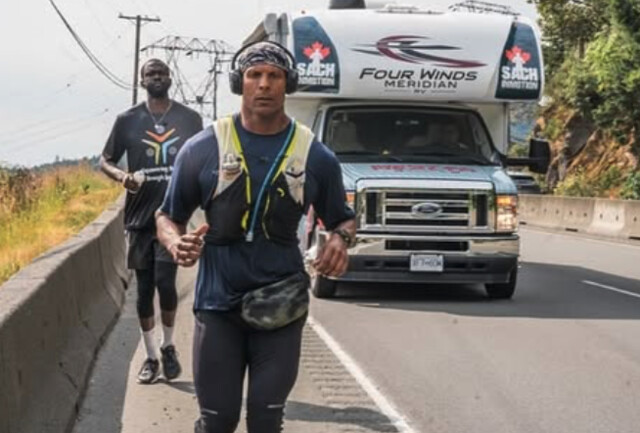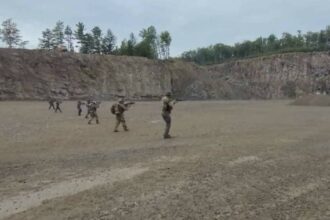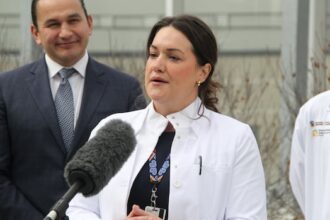In the predawn hours as most Kelowna residents were still asleep, Dax Maclean continued his extraordinary mission along Highway 97. The 34-year-old Canada Border Services Agency officer from Windsor, Ontario isn’t just covering ground—he’s transforming grief into purpose through a remarkable 7,000-kilometer trek across the nation.
“Every step is for those who can’t take another,” Maclean told me during our conversation at the Kelowna waterfront, sweat still visible on his brow from his morning run. “Men’s mental health remains shrouded in silence, and that silence is literally killing us.”
Maclean’s journey, dubbed “Run to Remember,” began after losing his colleague Mark to suicide last year. The devastating loss sparked something profound in him—a determination to challenge the persistent stigma preventing men from seeking help during mental health crises.
“Mark was the guy who seemed to have everything together,” Maclean explained, his voice momentarily catching. “That’s the insidious nature of mental health struggles—they often remain invisible until it’s too late.”
His coast-to-coast campaign began in Victoria on April 15 and will conclude in St. John’s, Newfoundland, by late September. The physical toll has been considerable—blisters, muscle fatigue, and the psychological challenge of running approximately 45 kilometers daily regardless of weather conditions. Yet Maclean remains steadfast in his mission.
“I’ve witnessed remarkable changes during this journey,” he shared. “Men approach me after presentations, sometimes with tears in their eyes, saying they’re finally going to call that therapist or have that conversation they’ve been avoiding for years.”
The statistics supporting Maclean’s cause are sobering. According to recent Canada News reports, men account for approximately 75% of suicides in Canada, with particularly elevated rates among first responders, veterans, and men between 40-60 years old.
Dr. Helena Winters, a clinical psychologist specializing in men’s mental health at UBC Okanagan, confirms the critical nature of Maclean’s work. “Traditional masculinity norms often discourage vulnerability and help-seeking behaviors,” she noted in our recent interview. “What Dax is doing—modeling vulnerability while demonstrating incredible strength—creates a powerful counter-narrative.”
Local support for Maclean’s initiative has been substantial. When he arrived in Kelowna yesterday, a group of CBSA colleagues, first responders, and community members joined him for the final five kilometers, creating a moving procession through downtown. The Kelowna Mental Health Coalition hosted a reception where Maclean spoke candidly about his experiences both on the road and in addressing grief.
“The conversations happening in these communities are what this is all about,” Maclean emphasized. “Running across Canada gets attention, but the real change happens in those quiet moments when someone decides they deserve help.”
As Maclean prepares to continue eastward tomorrow, he remains focused on his dual goals of raising $100,000 for men’s mental health initiatives and generating one million conversations about mental wellness. Currently, he’s raised over $67,000 and has documented hundreds of meaningful exchanges through his social media presence.
For those following his journey, Maclean offers simple advice: “Check on your strong friends. Create spaces where vulnerability isn’t weakness. And remember that seeking help isn’t just brave—it’s essential.”
As we witness this remarkable journey unfold across our nation, perhaps the most important question remains: If one person can run 7,000 kilometers to break the silence around men’s mental health, what small but significant step might each of us take in our own communities to continue this vital conversation?










